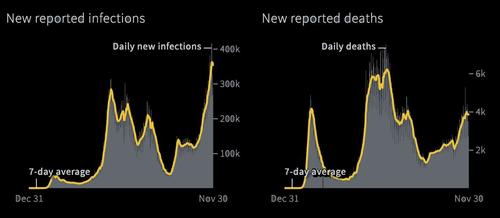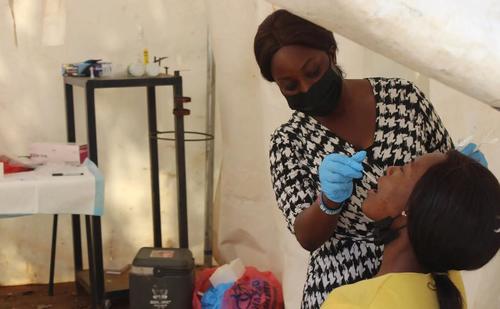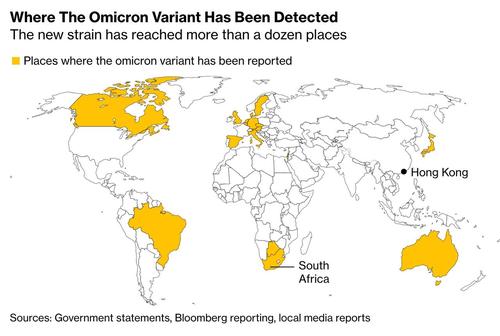Merkel, EU Chief Call For Vaccine Mandates As South Africa Sees Cases Double In A Day
As European countries from Germany, to Austria to the Netherlands tighten lockdown measures amid a surge in COVID cases (while deaths remain slightly elevated but more subdued), the continent’s unelected bureaucrat in chief, European Commission President Ursula von der Leyen, asked during a speech on Wednesday that EU members consider adopting a vaccine mandate. All members should “think about” imposing mandates of their own in a coordinated fashion that’s in keeping with the Continent’s new approach.
Source: Reuters
Speaking during a news conference, the European Commission chief suggested that member states need mandates to help prevent the spread of cases and a further spike in infections due to the emergence of new variants, such as the omicron strain.
“I think it is understandable and appropriate to lead this discussion now, how we can encourage and potentially think about mandatory vaccination within the European Union,” von der Leyen stated, adding that fighting the pandemic requires a “common approach” across the bloc.
Meanwhile, a former president of EU member Ireland published an editorial in Politico Europe Wednesday slamming the WTO’s refusal to approve sharing of intellectual property that would allow emerging countries to produce their own vaccines.
Epidemiologists warned us time and again that allowing the virus to spread around the world is a recipe for new mutations to develop and that they will indiscriminately harm us all. This waiver, which has now dominated WTO talks for over a year, is a necessary global solution to end the pandemic. Yet one powerful voice at the WTO has continued to undermine this effort — and that must change.
Isn’t it interesting how world leaders talk about vaccine mandates, while simultaneously ensuring that emerging countries will need to purchase their jabs from American pharmaceutical giants? But let’s put a pin in that.
South Africa has seen the number of new COVID cases doubled between Wednesday and Tuesday, according to official data released by the same people who issued the first warnings about the omicron variant.
What’s more, a top South African health official said the omicron variant would likely still be susceptible to the T-cell response caused by both natural and vaccine-induced causes. But that hasn’t stopped the country from seeing a surge in infections and reinfections, which has been particularly notable among the older population, officials said.
Back in Europe, outgoing Chancellor Angela Merkel has proposed new nationwide restrictions on people who haven’t been vaccinated.
Coincidentally, the WHO said earlier that indications are that most omicron cases will be mild, not severe. Of course, that’s true of delta and all the other strains as well. The organization later said that the world is still “in the midst” of the pandemic.
But the point is – as even some of South Africa’s top virology experts discussed earlier this week and over the weekend – that even if omicron does break through natural and vaccine-induced protections, infections will likely be mild in nearly all of these patients, and the body’s T-cell response will leave most people protected.
Confirmed cases of the omicron variant remained fewer than 300 (closer to 250 still by midday) while omicron cases were confirmed for the first time in South Korea (which has already imposed travel restrictions on southern African states), Saudi Arabia and Norway. More cases were found in new locations in the UK, Switzerland, Nigeria, Brazil and elsewhere.
No cases have been confirmed in the US, but several have been identified in Canada.
Source: Bloomberg
Here are some other important stories regarding COVID and the omicron variant:
- Poland reported 29K new COVID cases, the highest in almost eight months, and 570 fatalities, on Wednesday. More alarming: the Health Ministry said 25% of the deaths were among vaccinated patients, mostly elderly people with comorbidities. Prime Minister Mateusz Morawiecki called on the nation to get boosters ahead of Christmas. The country has imposed new restrictions on travelers but hasn’t confirmed a single case of omicron.
- WHO members voted to start drafting an international agreement to help avoid future pandemics as more cases amid the spread of the omicron variant. The WHO’s members approved a proposal Wednesday that set a deadline of 2024 to try to implement such a measure. They didn’t resolve the biggest disagreement, however: whether the accord should be a legally binding treaty.
- OECD chief economist Laurence Boone says it would cost $50 billion to vaccinate the world, a sum that pales in comparison to the $10 trillion G-20 countries have spent mitigating the impact of the pandemic. Too bad the US-controlled WTO won’t share the recipe with the emerging world.
- The EU is preparing to recommend that member states review their travel rules daily. They should pursue a “coordinated approach” and be prepared to impose new controls if necessary.
- Finally, Israel’s coronavirus czar Salman Zarka said the country should look at mandatory vaccination now that the omicron variant has emerged. “Mandatory vaccination needs to be considered, whether through legislation or otherwise, especially given the fact that not only is the pandemic here, but I fear it will get worse,” Zarka said on 103FM radio. He said he changed his mind following the appearance of omicron, which has been identified in several Israelis.
- The US is preparing to impose new travel restrictions while the CDC plans to tighten COVID screening and testing at airports around the country by requiring international travelers to have a negative COVID test result from the past 24 hours.
- WHO adds that vaccine makers shouldn’t rush to rework their vaccines because they’re not sure whether new vaccines are necessary.
- Austrian lawmakers extended a nationwide lockdown for a second 10-day period to suppress the latest wave of coronavirus infections before the Christmas holiday period.
Nigeria, meanwhile, has detected a case of omicron from October, the latest piece of evidence to suggest that the variant has likely already spread around the world. The Netherlands says it has found a case of omicron from two weeks ago. Before this, the earliest known sample of the variant was collected on Nov. 9 in South Africa.
Tyler Durden
Wed, 12/01/2021 – 12:50
via ZeroHedge News https://ift.tt/3EcN168 Tyler Durden


